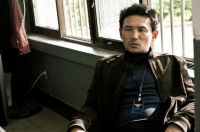Ryoo
Seung-wan’s “The Unjust” came in at number seven among the top grossing
Korean films of 2010, with a worthy 2,751,185 admissions. Its intricate
plot and morally unchecked urban reality is infested with manipulative
power players in a contemporary crime thriller where justice is
ironically served and forcefully consumed.
Ryoo
Seung-wan frames Korea’s capital as a sickly corrupt urban jungle,
notably void of any ethical foundation or political transparency.
Political corruption plagues every juncture as power players run circles
around each other attempting to serve their own ends, all the while
manipulating public discourse through persuasive misinformation. It's a
dark place ruled by a corrupt and puppeteered police force, self-serving
public officials, and cutthroat businessmen.
What
gets the ball rolling is the high profile case of a serial killer who
rapes and dismembers young school girls. Pressed for results by the
president and needing to restore public faith in the police force,
Captain Choi Cheol-gi (Hwang Jung-min, “Shiri”, “A Bittersweet Life”,
”Blades of Blood”) is tasked in setting up a scapegoat for public
digestion. Choi targets a man with a similar criminal record and uses
the gangster/property tycoon Jang Seok-gu (Yoo Hae-jin, “Attack the Gas
Station!” and the recent hit “Moss”) to press him into becoming their
fall guy.
In
turn, Choi gets caught up in Jang’s property-bidding war with a
corporate rival. This inadvertently introduces Joo Yang (colourfully
played by Ryoo Seung-beom from “The Servant”), an equally corrupt and
prominent public prosecutor. Joo is quietly assisting Jang’s rival in
acquiring the property in question and becomes fixated on Choi and his
case when his questionable involvement in the bidding war threatens to
surface.
Ryoo
Seung-wan mentioned the film’s theme was linked to a number of recent
government scandals of corruption and dishonesty. His cynicism is
clearly felt as the film's nihilism renders morality as existing outside
public positions of power. The sense of justice in the film is unevenly
dispensed and tailored to individuals rather than objectively serving
as recourse for public organisational infringements. Fitting then is the
film's comments on deep-rooted moral decay depicted in trusted public
servants.
“The
Unjust” spins a web of corruption with amoral gatekeepers and
individuals that are either willing victims of this world or active
drivers of it. The acting in the film is excellent and some of the big
names really bring their top performances to screen. Ryoo Seung-beom’s
character is explosive and well seated within the film. Yoo Hae-jin’s
performance is sharp as he plays the borderline manic and destructive
property tycoon. With a plot involving so many key figures, it is
important that each stand up and get counted.
The
storytelling is charged and thematically orientated, helped greatly by
Park Hoon-jeong-I’s (scriptwriter for “I Saw the Devil”) fluid and
kinetic screenplay. The film does suffer from some pacing issues in the
last 20-30 minutes but it is not enough to deter from its overall
powerful impact and lasting impression.
-Christopher J. Wheeler
Please feel free to comment on this review. Discussions are welcomed!










No comments:
Post a Comment